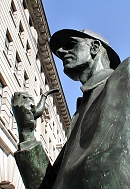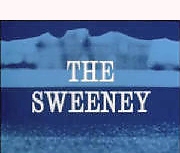|
elementary, my dear Watson

The most famous words that Sherlock Holmes never uttered in the stories
by Arthur Conan Doyle. He came closest in ‘The Adventure of the Crooked Man’ (1893):
‘I
have the advantage of knowing your habits, my dear Watson,’ said he. ‘When your round is a short one you walk,
and when it is a long one you use a hansom. As I perceive that your boots, although used, are by no means dirty, I cannot
doubt that you are at present busy enough to justify the hansom.’
‘Excellent!’ I cried.
‘Elementary,’
said he.
Although it has not been confirmed, the precise phrase is said to have been spoken on the stage by William
Gillette (1853–1937), in one of his famous portrayals of the Baker Street sleuth, and this may have prompted P.G. Wodehouse
to put the words into the mouth of his character Psmith in Psmith Journalist (1915). The first documented use of
the phrase by Holmes himself came in the closing scene of the film The Return of Sherlock Holmes (1929):
Watson: Amazing, Holmes.
Holmes: Elementary, my dear Watson, elementary.
Basil Dean and Garrett Fort (screenwriters)
frighten the horses, to
To alarm
people. The words are attributed to Mrs Patrick Campbell (1865–1940) in Daphne Fielding’s The Duchess of Jermyn
Street (1964):
‘It doesn’t matter what you do in the bedroom
as long as you don’t do it in the street and frighten the horses.’

get your trousers on, you’re nicked
A
line written by Ian Kennedy Martin (b.1936) and delivered by John Thaw (1942–2002), playing Detective Inspector Jack
Regan, in ‘Regan’, an ITV Armchair Cinema episode broadcast in 1974. The choice of words epitomized the
production’s supposedly realistic portrayal of a rough, tough London policeman who contrasted sharply with the benign
characters that had formerly populated most TV crime dramas. The show’s broadly favourable reception led to the creation
of a spin-off series: The Sweeney.
Some [real-life policemen], it is alleged, even tried to emulate
Regan’s tough-guy persona. (Cue mental picture of coppers in Frinton charging into villain’s home crying: ‘Get
your trousers on, you’re nicked!’)
New Statesman (26 March 2001)
not a lot of people know that
A
catchphrase personifying the actor Sir Michael Caine (b. Maurice Micklewhite, 1933). It originated in a remark made by Peter
Sellers, interviewed by Michael Parkinson in 1972:
Mike’s always quoting from the Guinness Book of Records.
At the drop of a hat he’ll trot one out. ‘Did you know that it takes a man in a tweed suit five and a half seconds
to fall from the top of Big Ben to the ground? Now there’s not many people know that!’
quoted in Nigel
Rees: Brewer’s Famous Quotations (2006)
Caine was born in Rotherhithe, the son of a Billingsgate market
porter, and grew up in Camberwell (where he attended Wilson’s grammar school) and the Elephant and Castle. He has played
major parts in more than a hundred films, including Alfie (1966), Get Carter (1971), Mona Lisa
(1986), Little Voice (1998) and Harry Brown (2009).
not bloody likely
A line famously
uttered by Eliza Doolittle in Act 3 of George Bernard Shaw’s Pygmalion (1913): ‘Walk! Not bloody likely.
I am going in a taxi.’ It caused considerable outrage at the time and the mock-euphemistic ‘not Pygmalion likely’
was afterwards used in literate circles. Although the real-life usage of the phrase long ago lost its exclusivity to London,
it retains some of its original associations:
Jerry: Did she think she was gonna leave this incredibly erotic
message on my tape and I was just gonna let it go? Not bloody likely.
Kramer: What is that?
Jerry: That’s my cockney
accent.
Larry David, Don Mcenery and Bob Shaw: Seinfeld, ‘The Tape’ (TV comedy) (1991)
Pray, Sir, have you ever seen Brentford?
Dr
Johnson’s response to Adam Smith after the Scottish economist had extolled the charms of Glasgow at some length, recorded
in James Boswell’s Life of Samuel Johnson (1791).
we never closed
The boast of Vivian
van Damm (c.1889–1960), manager of the Windmill Theatre during the Second World War. Even when a bomb landed
next door, killing an electrician and injuring one of the performers, the show went ahead. Among the theatre’s morale-boosting
specialities were groups of unclothed women arranged in ‘artistic’ tableaux, with strict instructions not to move
as much as an eyelid. When the doors opened for each performance there was a stampede of men to the front six rows, where
the seats had constantly to be repaired.

Westminster Abbey or victory!
The
reported words of Commodore Horatio Nelson (1758–1805) before the Battle of Cape St Vincent (1798), at which he was
victorious. A year later, as rear-admiral commanding the British fleet at the Battle of the Nile, he is supposed to have said:
‘Before this time tomorrow I shall have gained a peerage, or Westminster Abbey.’ He was afterward made Baron Nelson
of the Nile. Vice-Admiral the Viscount Nelson died at the Battle of Trafalgar and was buried with unprecedented pomp in St
Paul’s Cathedral in January 1806.
|

